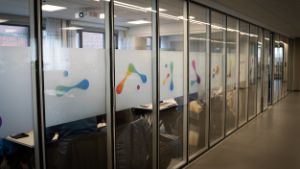The bi-weekly ODD seminar series at CCSE - Page 3
The seminar will be in Norwegian: "Vi presenterer en modell for kompetanseheving i realfaglig programmering for lærere. Modellen tar for seg opplæring i programmering på fagenes premisser, og vi ser på hvordan en slik modell kan brukes for lærere i høyere utdanning."
Computational thinking are by some defined as the capability to resolve problems algorithmically and logically, including skills related to representing, organizing and identifying patterns in data. This may be seen as leaning in a direction of discrete and observable processes. The Norwegian translation to "algoritmisk tenkning" can be read even clearer in the direction of defining explicit, deterministic instructions to achieve a well understood outcome. At the same time, computational thinking is not only promoted as a means to allow the development of concrete code/algorithms, but also as a way of thinking constructively about phenomena in a variety of fields. And it is clearly not the case that all phenomena in nature and society only involve discrete, directly observed entities - to the contrary, many relations and processes we may be interested in are continuous and probabilistic in their nature, where we have to constructively relate to risks, uncertainties and underlying patterns. An interesting question is whether the ability to devise algorithms to solve well defined problems and the ability to relate constructively to questions in an uncertain world should be seen as two aspects of the same skillset, or as separate skills that are cultivated through separate learning experiences.
What do we mean by "learning programming", why do many find it challenging to learn, what are really the main challenges, which aspects do people in different settings need to learn and how do they best learn it? Geir Kjetil Sandve will give a brief introduction to a discussion where we look forward to hearing experiences and viewpoints inspired by the myriad settings where people in our environment have been involved in programming.
Tor Ole Odden:
"The field of educational research has a massive literature base, with many journals that have been publishing articles for almost a century (or longer). How do we sort through and make sense of literature at this scale? We have begun using an unsupervised machine learning technique from the field of natural language processing, known as latent Dirichlet allocation, to analyze articles from the fields of physics education research and science education research. This technique allows us to extract latent themes, or topics, from the literature and quantify the rise and fall of those topics over time.
In this talk, I will present the basics of the technique, describe some of its underlying theory and applications, and showcase some of the trends that it reveals in how science education theory and practice has evolved over the last 20-100 years."
